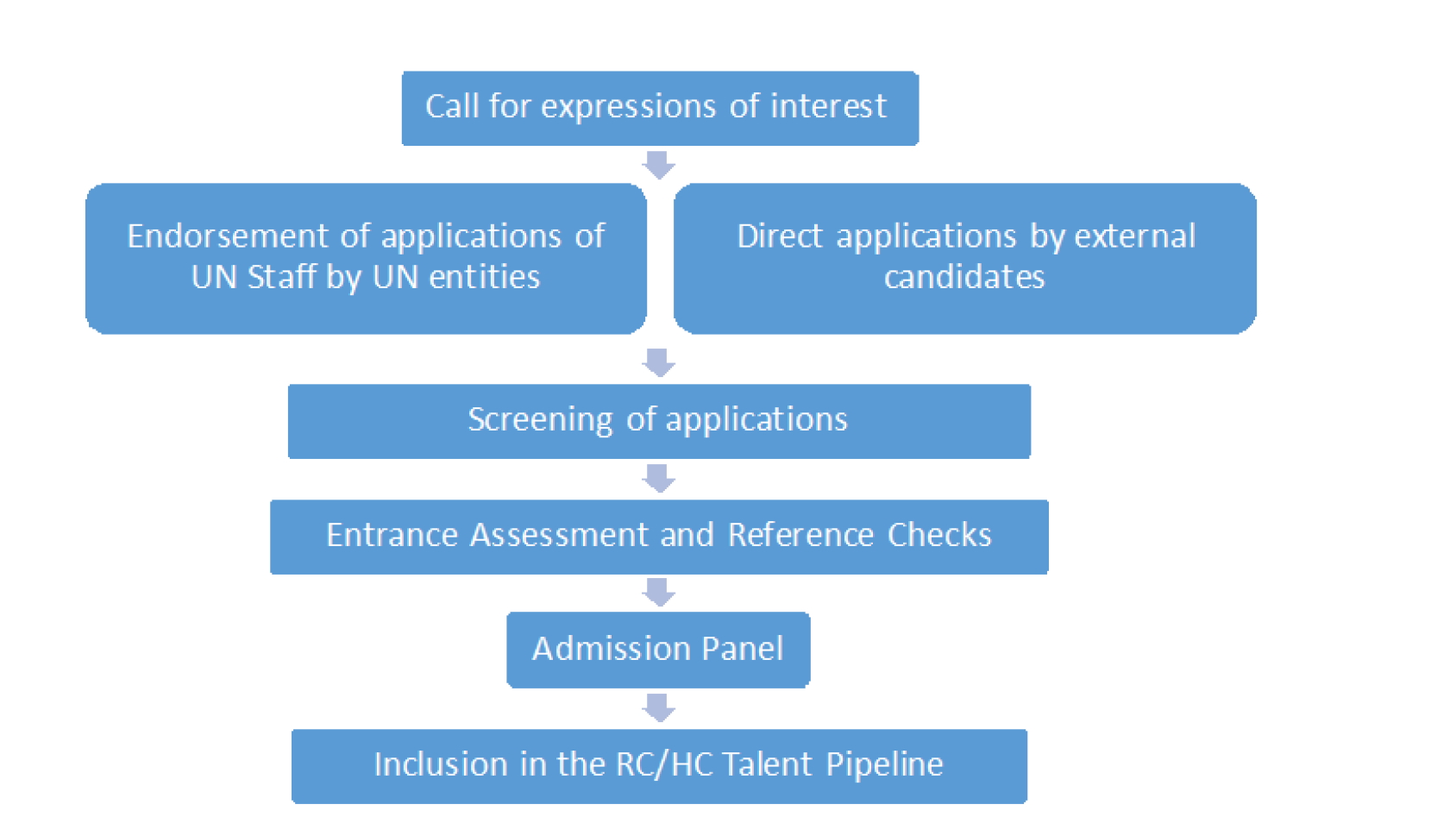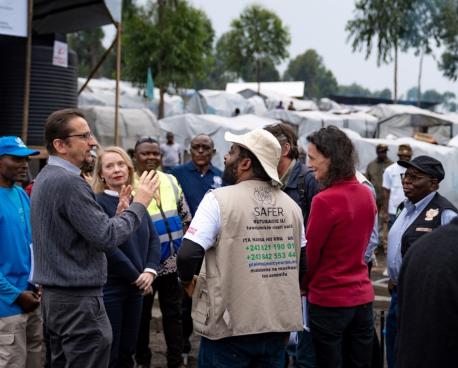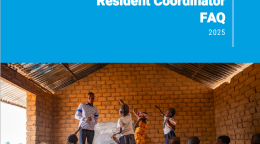The RC/HC Talent Pipeline is a talent initiative jointly managed by the United Nations Development Coordination Office (DCO) and the United Nations Office for the Coordination of Humanitarian Affairs (OCHA).
The RC/HC Talent Pipeline aims to identify and groom a broad and diverse range of high calibre candidates for Resident Coordinator and/or Resident Coordinator/Humanitarian Coordinator functions, and to develop them for those roles. It comprises both candidates who are ready for the Resident Coordinator Assessment Centre (RCAC) and those who have the potential of being ready within three years.
Placement in the RC/HC Talent Pipeline does not guarantee an invitation to the Resident Coordinator Assessment Centre (RCAC), which remains a prerequisite for applying for RC and RC/HC positions.
Who can apply?
We are looking for leaders who demonstrate the values, attributes, knowledge and competencies outlined in the RC Leadership Profile:
- Values: inclusion, integrity, humility and humanity.
- Foundational attributes: passion, courage, emotional intelligence, openness to learning, creativity, flexibility, resilience, and accountability.
- Knowledge: wide range of knowledge across the development, humanitarian, human rights and security domains.
- Competencies: capacity to analyse complex environments and identify pathways for impact (Systems thinking); build trust with a wide variety of partners and facilitate collective action (Co-creation); drive a culture of achievement and impact for the 2030 Agenda and human rights (Focus on impact); foster innovation and lead change (Transformational change).
Candidates to the RC/HC Talent Pipeline must meet all the following eligibility criteria:
- Master’s degree or equivalent in development studies, international relations, political science, economics, social sciences, human rights, law, or closely related fields (for otherwise suitably qualified candidates, a first level university degree with a relevant combination of academic qualifications and experience may be accepted in lieu of an advanced post graduate university degree);
- Be at the P-5 level or above, or at an equivalent level of seniority outside of the UN system;
- A minimum of twelve (12) years of substantive experience and results in leadership roles at the international level with a focus on development, human rights, peacebuilding, political affairs and/or humanitarian work, including at least two (2) years of senior representational experience at the country level (e.g., Country Director, Representative, Head of Office) in the past ten (10) years, preferably outside of one’s own country.;
- Ability to serve for at least one tour of duty (i.e., five years) before reaching the mandatory age of separation (65 years) at the time of RCAC participation, if invited;
- Rating of “Fully met performance expectations” or equivalent, in the last two performance appraisals, where applicable;
- Fluency in English and fluency in another UN official language than English and/or fluency in a local language of the countries where RCs and RC/HCs serve;
- Record of good standing; candidates will not be considered if they have committed violations of international human rights law, violations of international humanitarian law, sexual exploitation, sexual abuse, or sexual harassment, or if there are reasonable grounds to believe that they have been involved in the commission of any of these acts.
- Commitment to fully engage in RC/HC Talent Pipeline activities with the intention of pursuing an RC or RC/HC role within the next 1 - 3 years, if successful at the RCAC.
Eligible candidates may be evaluated against the following desirable criteria:
- Experience serving on UN Country Teams/Humanitarian Country Teams, or equivalent;
- Experience in inter-agency coordination, or equivalent;
- Experience in developing strategic partnerships with governments, intergovernmental entities, the private sector and other stakeholders;
- Experience working in or with Small Island Developing States (SIDS);
- Experience working on development and humanitarian financing, and SDG transitions (food systems, energy access and affordability, digital connectivity, education, jobs and social protection, climate change, biodiversity loss and pollution).
Placement in the RC/HC Talent Pipeline lasts 3 years and within that time, candidates must be able to meet the minimum eligibility criteria of the Resident Coordinator Assessment Centre (RCAC).
Placement in the RC/HC Talent Pipeline does not guarantee an invitation to the RCAC.
At this moment it is not possible to apply to the RC/HC Talent Pipeline. The next call for expression of interest is scheduled to be launched in January 2026. Please check the website regularly for updates.
How are RC/HC Talent Pipeline members selected?
Once a year, DCO and OCHA issue a joint call for expressions of interest to the RC/HC Talent Pipeline. UN staff must be endorsed by their entity (UN staff on loan or secondment must seek endorsement from their parent organization); applications of candidates external to the UN system do not require endorsement.
Applications are reviewed against the eligibility criteria and selected candidates undergo a rigorous assessment focusing on the core elements of the RC Leadership Profile as well as reference checks. Those identified by the inter-agency Admission Panel as having the highest potential are included in the RC/HC Talent Pipeline.

What do RC/HC Talent Pipeline members benefit from?
Members of the RC/HC Talent Pipeline will be offered tailored opportunities to develop their knowledge, competencies, and exposure to the RC and HC roles as well as across the pillars of the United Nations’ work (development, peace & security, human rights, humanitarian).
The duration of members’ stay in the pipeline will vary depending on their needs, and should not exceed 3 years. Once pipeline members are deemed ready, they are encouraged to apply to the Resident Coordinator Assessment Centre, which is a pre-requisite for applying for RC vacancies.
Membership of the RC/HC Talent Pipeline does not guarantee a seat at the Resident Coordinator Assessment Centre.
Who are the RC/HC Talent Pipeline members?
For details on the composition of the current RC/HC Talent Pipeline, please visit the RC/HC Talent Pipeline Members' Key Data webpage.
The statistics are regularly updated to reflect members entering, graduating or leaving the pipeline.
Where can I find more information on the compensation of an RC and practical questions on the Resident Coordinator career track?
For further details, please refer to the pay and benefits webpage of the United Nations, specifically the section for "Professional and Higher Categories" staff. For more information on your compensation package, please visit the ICSC’s Common System Compensation Package Portal to calculate your estimated remuneration.
Please note that external candidates from outside the United Nations system must formally resign from their current employer before assuming a Resident Coordinator position, if selected. In line with UN policies on the neutrality and independence of international civil servants, candidates affiliated with a national government who are selected for an RC position must confirm in writing prior to taking up the position that they no longer retain any contractual affiliation with their government.For more information, please refer to the Staff Regulations and Rules of the United Nations Secretariat.
We also invite you to check out the FAQ on Becoming a Resident Coordinator. You will find useful information on the talent pipeline, the various stages of the selection process to become a Resident Coordinator and on practical issues related to the RC career track.




